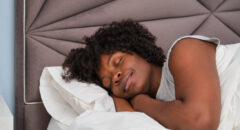
Sleep is the one activity that unequivocally helps your body function.
“Sleep services all aspects of our body in one way or another: molecular, energy balance, as well as intellectual function, alertness and mood,” National Institutes of Health neuroscientist Dr. Merrill Mitler said in a newsletter.
Although the importance of sleep is common knowledge, the truth is that you may be sabotaging your own rest.
How to get a better night's sleep? Here are five habits to kick for a better night’s sleep:
1. Sleeping in.
If it feels like it’s harder to wake up Monday morning after two days of sleeping in, it’s because it is. When you wake up at different times throughout the week, your internal clock gets constantly reset. Instead, wake up at a similar time on the weekend so that you don’t break your body’s rhythm.
2. Overloading on caffeine.
From coffee to tea to soda, the caffeine you drink during the day adds up. Eliminate caffeine from your diet at least six hours before bedtime, based on a study by researchers at Michigan’s Henry Ford Hospital’s Sleep Disorders & Research Center and Wayne State College of Medicine.
RELATED: 6 Tips For Fighting Those Sleepless Nights
3. Long afternoon napping.
Short naps that are 15 to 20 minutes can help you recharge when you’re exhausted and it’s nowhere near bedtime, but sleep longer than that and you’re in trouble. Try to stop napping if it’s causing insomnia, but if you can’t get through the day without a little siesta, make sure that it’s short.
4. Skipping the day’s workout.
It’s easy to skip a workout when your schedule is jam-packed, but exercise is an important part of reducing stress and improving your mood, which helps you sleep. Sketching out just 30 minutes of moderate exercising most days of your week will help, according to a study by Harvard Medical School.
RELATED: 9 Tips for a Good Night's Sleep
5. Staring at too much light.
To sleep, you need melatonin — a neurohormone that causes sleep — and to produce it, your brain needs dark. Too much light, especially from staring at a computer or television screen before you go to sleep, can stop you from falling asleep quickly.








